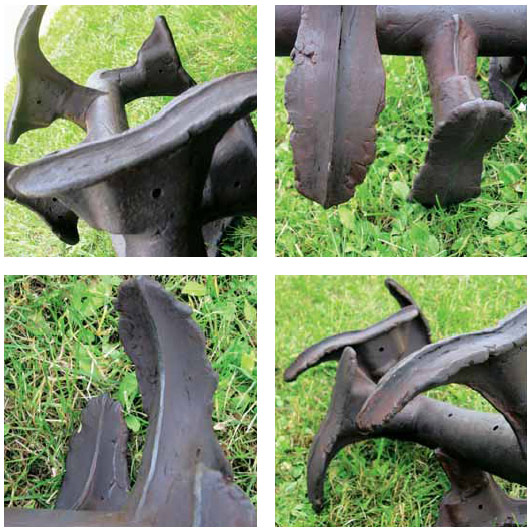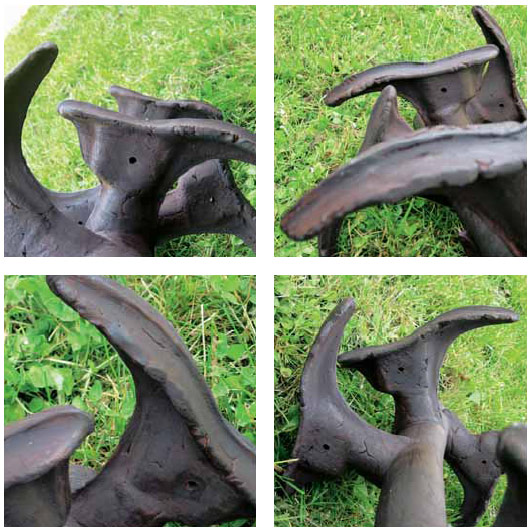|
kiparska postavitev na prostem / open-air art installation
Vrt Komenskega 8, Ljubljana, iz cikla Štirje letni časi na Vrtu / Poletje 2006
Garden Komenskega 8, Ljubljana, From cycle Four seasons in the Garden / Summer
2006
17. 6. - 31. 8. 2006
Vokalni večer: Metod Banko, Od ljudskih pesmi do improvizacije
Accompanying vocal music: Metod Banko, From folk songs
to improvisation
Tekst/Text | Slike | CV |

Eva Peterson Lenassi je ustvarjalka, ki svojo kiparsko misel
že od vsega začetka
razvija v glini. Glina, v vseh možnih različicah, je zanjo
več kot zgolj material. Pomeni ji
kompleksen miselni in ustvarjalni koncept. Razume jo kot
izjemno čutno materijo z močno
simboliko prvobitnosti narave in življenja. Vse kar lahko
ustvari iz nje naredi v simbiozi
z okoljem, zato jo spaja zlasti z naravnimi ambienti.
Že
leta 1995 se je lotila projekta postavitve glinenih objektov
na
obali reke Save. Kasneje je s ciklom Enaindvajseto stoletje
ustvarila na desetine keramičnih škorenjcev in z njimi
sestavljala talne vzorce. Načelo repeticije je ena od vidnejših
formalnih
značilnosti njenega dela. Tudi v tokratni postavitvi je
uporabila en sam element, ki v osnovi izhaja iz istega projekta.
Element
glinenega škorenjca je vlila, odtisnila v kalupe, ga na
ta način razmnožila in zvarila v nenavadne kovinske hibride
valjastih oblik. “Škorenjci”, krožno nameščeni okoli dane
osi, učinkujejo kakor bizarni štrceljni in tako spregovorijo
popolnoma novo zgodbo o času, človeku in pomenu koraka-simbolu
večnega gibanja. Postavljeni na travnata tla učinkujejo
kot
bi se sprehajali nekje med preteklostjo, sedanjostjo in
prihodnostjo. Odvisno od našega zornega kota jim lahko določamo
različne pomene. Pogled v podplate je pogled v odhajanje,
pogled
v njihovce našpičene konice, pogled v prihajanje. Okoli
osi
so razmeščeni tako, da se nam korak, ki je še pravkar
pred nami, že v naslednjem hipu izmuzne v preteklost. Zdi
se
kot bi se sprehajalo po travnati površini desetine nog,
ljudi,
korakov, osebnih zgodb. Čeprav v osnovi statična, deluje
sleherna skulptura zelo dinamično.
Zaradi ponavljanja
enega elementa, znotraj enega samega objekta, dobimo
na različnih točkah našega očišča nekakšen futuristični
vtis gibljivega dinamizma skulpture. Sama tak princip
imenuje ženski princip, pri katerem gre po njenih besedah
za “poseben
princip nastajanja monumentalnega dela, ki temelji
na nizanju drobnih
gibov, drobnih akcij v večje in večje celote”. Bistvo
njenih skulptur in projektov je tako skrito v potrpežljivem,
preciznem
delu, ki na daljši rok rezultira v presenetljivih in
kompleksnih rešitvah. Kiparka se pri svojih postavitvah
rada osredotoča
na površino tal, njihovo strukturo. Stik z njimi ji
pomeni primaren stik z zemljo, z glino, z življenjem. Tudi
travnik
vrta je
zato ponovno izkoristila za svoj ustvarjalni poligon,
tokrat sicer ne, da bi iz biljk spletala dolge kite.
Tudi ne,
da
bi skoznje sprehodila svoje prste, pač pa da po njem
sprehodi korake, neznane, prihajajoče in odhajajoče,
da sprehodi
čas in z njim tudi naše, enaindvajseto stoletje.
Barbara Sterle Vurnik

Eva Peterson Lenassi is a fine artist who
from the very beginning has developed her
sculptural concepts through clay. Clay, in all its possible varieties, she understands
as more than simply a material. To her it is a complex, mindful, and creative
concept.
She comprehends clay as an exceptionally sensitive material with a powerful symbolism
for the primeval origins of nature and life. Everything that she creates from
clay she does
in symbiosis with the surroundings and thus she ensconces her clay pieces in
some natural ambiance.
In 1995, Eva undertook a project of placing clay objects
along the shore of the
Sava
River. Recently, in her series The 21st Century, she created tens and tens
of little ceramic
boot-like forms and arranged them into patterns on the ground. The principle
of repetition is one of the more noticeable formal characteristics
of her work. The arrangement in this exhibition also uses
only one element, which is derived from the same series. She formed the clay-boot
elements by pressing clay into a mold and reproduced and welded numbers of
them into an unusual metallic hybrid of tubular shapes. The boot-like objects
placed
in a circular manner around an axis create an effect of bizarre stumps and
in this way speak of an entirely new story of time, man, and the significance
of a step—a symbol of eternal motion. Placed on the grassy ground, they appear
to be ambling somewhere between the past, present, and future. Depending on
our point of view, we can discover various meanings. A look at the sole is
a look at departure, a look at their pointed tips, a look at arrival. They
are located around the axis such that the step that is just now in front of
us
is in the next instant slipping into the past. One gets the impression that
walking around the grassy surface are scores of feet, people, steps, personal
stories. Although basically static, each of her sculptures operates dynamically
on our senses.
Because of the repetition of one element within a single
object, we get, from different views of our focal point,
a futuristic impression of a movable dynamism of the sculpture.
Eva calls such a principle “women’s principle,” which involves,
in her words, “a special principle of the creating of a monumental
work through the piecing together of little movements, little
actions into larger and larger wholes.” The essence of her
sculptures
and projects is hidden in the patient, precise work that over time results
in surprising and
complex solutions. The sculptor in her compositions focuses on the surface
of the ground
and its structure. Contact with it means to her a primal contact with
the earth, with clay,
with life. This is why she again uses a grassy field for her creative
domain, but this time not to weave braids from long blades of grass,
and likewise not to take a walk with her fingers through the grass, but
instead so that across this grass there walk steps, steps unknown, coming
and going, and so that there walks time and with it also our 21st century.
Barbara
Sterle Vurnik




Detajli skulpture iz cikla Enaindvajseto stoletje
Details from the series, The 21st Century

življenjepis / Curriculum vitae
Eva Peterson Lenassi je bila rojena 27. 10. 1959 v Kopru. Diplomirala je na Akademiji
za likovno umetnost v Ljubljani iz kiparstva. V letih 1995-1999 je bila izredna
študentka
keramike na Indiana University v Bloomingtonu, Indiani v ZDA pri prof. Timu Matherju
in prof. Johnu
Goodhardtu. Biva v Ljubljani kot samozaposlena v kulturi.
Eva Peterson Lenassi
was born on 10th October 1959 in Koper. She graduated in
sculpture from the Academy of Arts in Ljubljana. From 1995 to 1999 she studied
ceramics at Indiana University, Bloomington, Indiana, her
professors were Tim Mather and John Goodhardt. She lives
and works freelance as a fine artist in Ljubljana.
Razstave in dogodki / Exhibitions and events
1995
Dol pri Ljubljani, projekt postavitve glinenih objektov
na obrežju reke Save (dokumentarni filmski zapis) / Individual
project at Dol pri Ljubljani,
exhibiting ceramic objects on the banks of the Sava River
2003,
Lokovec v Trnovskem gozdu, likovna delavnica Hrepenilda
(spletanje trav in situ) / Art symposium HREPENILDA,
plaiting tall flowering grasses in the village Lokovec
in the Trnovo woods
2004
Indianapolis, ZDA, The 2004 International Orton Cone Box
Show, NCECA, razstava nato potuje dve leti po ZDA / The
2004 International Orton Cone
Box Show, NCECA, Indianapolis, USA, and on a two-year tour around the
USA
2004
Amaroussion, Grčija, 1. European Ceramic Competition
EUCECO / 1st European Ceramic Competition EUCECO, Amaroussion,
Greece
2004 Postojna, 1. bienale slovenske keramike
Na svoji zemlji (priznanje) / 1st Biennale of Slovenian
Ceramics ON OUR
EARTH (award)
2004 Grad Podsreda, pregledna razstava
slovenske keramike “Keramika v Sloveniji 1964 - 2004” (prenos
v Narodni
muzej Ljubljana) / The
Podsreda castle and
the National Museum in Ljubljana, overview of Slovenian ceramics,
CERAMICS IN SLOVENIA 1964 - 2004
2004 Galerija Loterije Slovenije,
“Strukture”, razstava treh avtorjev / A show by three artists
STRUKTURE in the Galerija
slovenske loterije
2005
Postojna, Predjamski grad, Razstava
nagrajenih avtoric s 1. bienala slovenske keramike
Na svoji zemlji 2004 / A show of awarded authors from the
1st Biennale of Slovenian Ceramics ON OUR EARTH
2005
Piran,
Ex-tempore Piran 2005, VI. mednarodni ex-tempore keramike
(nagrada za najbolj izvirno delo) / VI. International
Ex-tempore
in Ceramics Piran,
(award for the most innovative artwork)
2006
Piran, Meduza
2, “Fructus ignis” delo meseca / FRUCTUS IGNIS, The Artwork
of the Month, Piran, The Meduza gallery
Naslov / Address
Majaronova 20, 1000 Ljubljana, Slovenija
telefon / telephone: +386 1 437 6071, mobile: +389 40 384
345,
e-mail: lenassieva@yahoo.com

organizacija razstave in izdajatelj / Organization of the exhibition and publisher:
Društvo likovnih umetnikov Ljubljana, zanj / Represented by: Alenka Vidrgar in
Dušan Muc
kustosinja razstave / Curator: Barbara Sterle Vurnik
postavitev razstave / Installation of the exhibition: Eva Peterson Lenassi
besedilo / Text: Barbara Sterle Vurnik; prevod v angleščino / English translation:
Bruce J. Peterson; fotografija / Photography: Eva Peterson Lenassi;
Katalog: priprava in tisk / DTP and printed by: Mat-Format d.o.o.; naklada /
Print
run:
300 izvodov / Copies; junij / June 2006; Ljubljana, Slovenija
Razstavo je podprl Oddelek za kulturo in raziskovalno dejavnost
Mestne občine Ljubljana / The exhibition is supported by
the City of Ljubljana

|